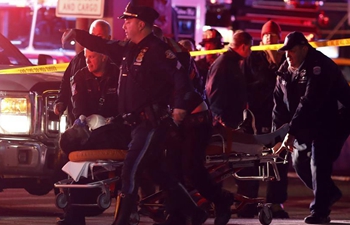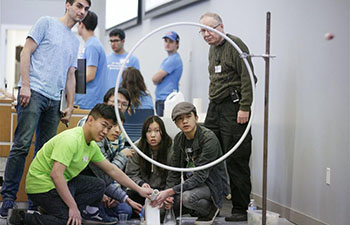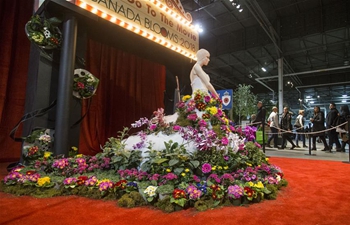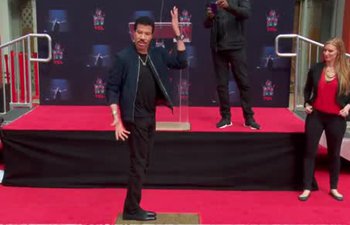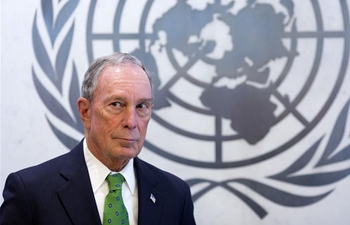by Raimundo Urrechaga
HAVANA, March 11 (Xinhua) -- Millions of Cubans went to the polls on Sunday to elect more than 600 lawmakers to the island's parliament, with the elected leaders representing a new generation in the Caribbean nation, marking a historical change.
More than 24,000 polling centers were opened throughout the country for Cubans to exercise their right to vote and to choose among the candidates for the National Assembly of People's Power, a legislative body that in turn will elect the president of the country in April.
Cuba's current leader Raul Castro, 87, announced to the parliament in December that he will not seek re-election for a third term of five years, which would open a new chapter in the nation's history.
It would be the first time since 1976 that a person who does not have the last name Castro would likely be the president of Cuba since the 1959 revolution.
"I think the change of president will be good because that way we will have a leader with newer and current ideas," Rosalia Martinez, a 22-year-old college student, told Xinhua.
Analysts expected that Castro's successor will be Miguel Diaz-Canel, the current first vice president of the country. Diaz-Canel exercised his right to vote on Sunday in his home province of Villa Clara, central Cuba, where he was nominated.
If elected, Diaz-Canel, a 57-year-old engineer, would not bring about major changes, because he has defended the political continuity on the island and maintained the socialist model, analysts said.
"The elected government will serve the people; the people will have a say in the decisions. This will be a government that responds to what the people want," he told reporters after voting.
Late in the afternoon, the National Electoral Commission (CEN) said over 6.9 million Cubans had voted, representing 78.5 percent of registered voters.
Final results will be presented on Monday by the CEN at a press conference.
The electoral turnout on the island historically is around 90 percent, although voting is voluntary and the number of candidates is traditionally equal to the number of available positions.
Cubans believe this process will deepen economic and social reforms started by Castro and also improve their daily lives.
"I think what the new government will do is continue working to improve what we have to do as a society, as a country, as a nation," Edgar Martin, a 40-year-old lawyer, told Xinhua.
His wife, Iselda Damerafon, who also voted at a Havana school on Sunday, told Xinhua that the challenges of the new leaders will be even greater because it is not simply about assuming a post, but about defending the legacy of Fidel Castro and Raul Castro.
Also, she said, they must make important decisions to promote the island's development as Cuba's current economic situation isn't the best.
"The new leadership will have more responsibilities and must deepen the process of economic reforms. They have to respond to the people and work for our country's growth and progress," she added.
Alicia Zayas and Jose Gabriel Navarro, two university students who were accompanied by their parents and grandparents, also voted in the elections.
"Coming to vote is a very important democratic exercise for all citizens because here we decide who will be our next leaders and it is good to have a say in the choice of who we believe is the most capable to do so," Navarro told Xinhua.
Meanwhile, Zayas said the vote isn't about a candidate but rather the nation's future because it will determine how the new government will be formed.
"As a young woman, I am proud to witness this change. It's true that Fidel and Raul (Castro) have been very good for this country and they will go down in history, but it is very important to give way to new generations and I'm very excited to see it happen," she said.
Foreign Minister Bruno Rodriguez, who is among the younger leaders in the country, said the electoral process is an authentic demonstration of democracy, as the people go to the polls to choose who will lead the nation to make the island's socialism more efficient and fair.
"The National Assembly will elect the new Council of State and its president. It will be done by a secret and direct vote by the elected lawmakers and there will be a certain sense of renewal and continuity," he added.
According to official data, the average age of candidates in this election is 49, more than 86 percent of them have a university degree, and 53.6 percent are women, a figure that would make Cuba's new parliament the second largest in terms of female representation in the world.
The historical generational change will officially take place after April 19 when the elected lawmakers vote for the 31 members of the State Council, including its new president, first vice president, five vice presidents, and other members.







